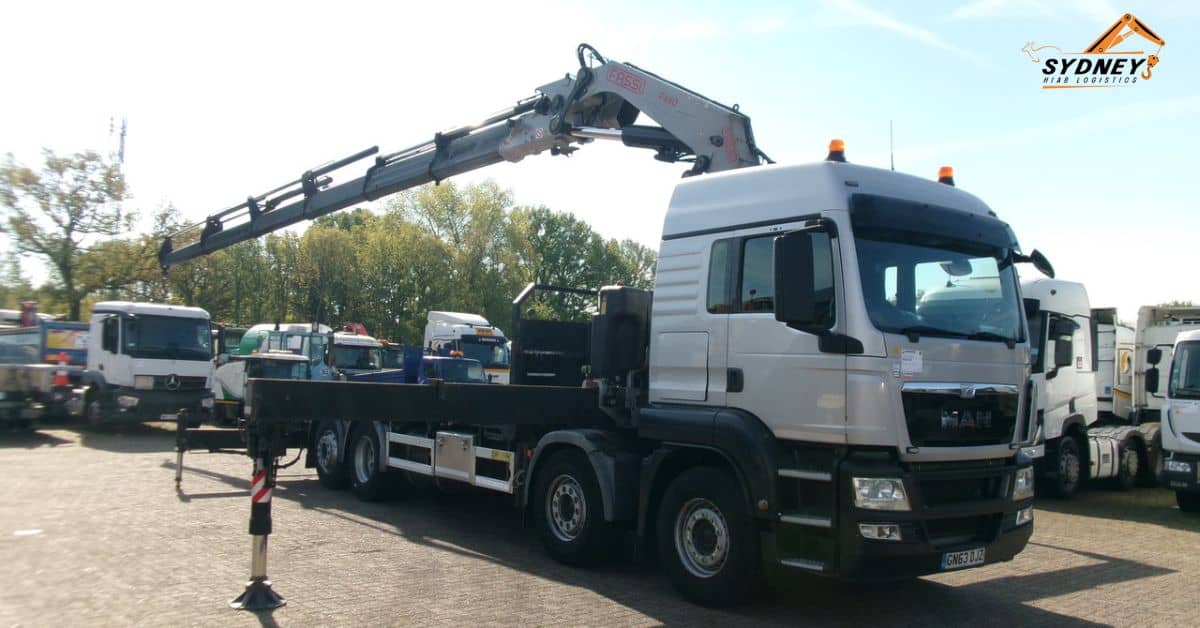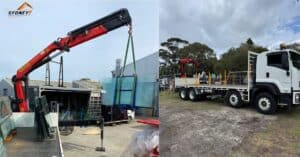Hiring a crane is a critical step in many construction, industrial, or logistical projects. Whether you’re lifting heavy materials to the top of a building, moving oversised equipment, or transporting goods, ensuring that the crane hire process goes smoothly is essential for safety and efficiency. However, choosing the right crane for the job involves more than just calling a hire company. You need to ask the right questions to ensure the crane meets your specific needs and requirements.
Here is a detailed guide to the essential questions you should ask before hiring a crane to guarantee the success of your project.
1. What Type of Crane is Best for My Project?
Before hiring a crane, it’s vital to determine which type of crane is most suitable for your project. Cranes come in various sizes and capabilities, such as:
- All-terrain cranes for rough outdoor surfaces
- Truck-mounted cranes for ease of transportation
- Rough-terrain cranes for off-road projects
- Telescopic cranes for flexible reach
Ask the crane hire company for advice on which model is best suited for the job, considering factors like the weight of the load, the height it needs to reach, and the terrain of the site.
2. What is the Maximum Lift Capacity?
Understanding the maximum lift capacity of the crane is crucial to avoid accidents or malfunctions. Overloading a crane can lead to disastrous results, so ensure the crane can handle the heaviest load on your site. Be clear about the maximum weight of the materials or equipment you need to lift, and verify that the crane you hire can manage that weight safely.
3. What is the Crane’s Reach?
The crane’s reach is another key factor, especially if you’re working on a multi-story building or need to move materials across a large distance. Ask the crane hire company about the vertical and horizontal reach of the crane to make sure it can extend to the required heights and distances without compromising safety.
4. Are You Licensed and Insured?
When it comes to heavy machinery, safety should be the top priority. Verify that the crane hire company is fully licensed and insured. This includes checking that the operator is qualified and holds the necessary certifications to operate the crane. Insurance coverage should also be sufficient to cover potential damages to property, injuries, or other liabilities.
5. Is the Crane Well-Maintained and Inspected Regularly?
Hiring a crane that is not properly maintained can lead to unexpected breakdowns or safety hazards. Ask the crane hire company for records of recent maintenance and inspections. The crane should meet industry standards and regulations for safety and performance. A well-maintained crane ensures not only operational efficiency but also a safer working environment.
6. What Are the Hire Costs and Inclusions?
Cost is always an important factor in any project. Before hiring a crane, ask for a detailed breakdown of the hire costs, including:
- Rental fees (by the hour, day, or project)
- Operator costs, if a trained operator is included in the hire
- Transportation fees for delivering and picking up the crane
- Additional equipment or accessories needed for the lift, such as slings or hooks
Clarifying these details upfront will help you avoid unexpected costs and ensure you’re getting the best value for your money.
7. Is the Crane Operator Provided or Do I Need to Arrange One?
Many crane hire companies provide an operator as part of the hire package. If the company offers a certified operator, it can save you time and hassle. However, if the operator isn’t included, you will need to hire someone with the right credentials separately. Ask about this when arranging your hire and ensure that whoever operates the crane is experienced and certified to do so.
8. What Are the Site Requirements for Setting Up the Crane?
Cranes require adequate space to set up and operate safely. Ask the crane hire company about the specific site requirements, including:
- Space for the crane: Ensure there is enough room for the crane and its supporting equipment.
- Ground conditions: The crane may need to be placed on solid, level ground. Soft or uneven surfaces may require stabilising mats or additional support.
- Access routes: Ensure the crane can easily access the site. Obstacles like power lines, narrow roads, or overhead structures may require careful planning.
9. How Long Does the Setup and Dismantling Take?
Understanding the setup and dismantling time will help you plan your project timeline more effectively. Cranes vary in the amount of time required to be fully operational once they arrive on-site. Knowing how long it takes to set up the crane can help you manage the scheduling of other activities, ensuring there are no delays.
10. What Are the Safety Precautions and Risk Management Procedures?
Safety should always be a primary concern when using heavy machinery like cranes. Ask the crane hire company about their safety protocols, including:
- Risk assessments: Do they perform a site inspection and provide a risk assessment?
- Safety equipment: Is the crane equipped with alarms, lights, and other safety features?
- Emergency procedures: What are their procedures in case of a malfunction or accident?
Additionally, ask if there are any specific safety requirements for your site, such as permits or additional personnel like signalers or riggers.
11. Can You Provide References or Testimonials?
A reliable crane hire company should be able to provide references or testimonials from previous clients. Check their reputation for timely delivery, professionalism, safety standards, and overall customer satisfaction. Positive reviews can give you confidence that the company will meet your expectations.
12. Are There Any Additional Services Available?
Some crane hire companies offer additional services that could be beneficial for your project, such as:
- On-site consultation: Helping you choose the right crane and plan the lift.
- Traffic management: If your project involves public spaces, the company may assist with road closures or traffic control.
- Post-hire support: Assistance with troubleshooting or unforeseen challenges during the hire period.
These services can add significant value to your hire and ensure the job is done efficiently.
Conclusion
Hiring a crane is a significant part of any large-scale project, and asking the right questions upfront ensures that everything runs smoothly. By understanding the crane’s capabilities, confirming the hire company’s qualifications, and making sure you have clear expectations around costs, timelines, and safety, you can avoid common pitfalls and get the job done safely and efficiently.
Working with a trusted crane hire provider that is licensed, insured, and experienced will give you peace of mind and help ensure the success of your project. Take the time to do your research and ask these essential questions before making your decision.
Hiring a crane is a critical step in many construction, industrial, or logistical projects. Whether you’re lifting heavy materials to the top of a building, moving oversised equipment, or transporting goods, ensuring that the crane hire process goes smoothly is essential for safety and efficiency. However, choosing the right crane for the job involves more than just calling a hire company. You need to ask the right questions to ensure the crane meets your specific needs and requirements.
Here is a detailed guide to the essential questions you should ask before hiring a crane to guarantee the success of your project.
1. What Type of Crane is Best for My Project?
Before hiring a crane, it’s vital to determine which type of crane is most suitable for your project. Cranes come in various sizes and capabilities, such as:
- All-terrain cranes for rough outdoor surfaces
- Truck-mounted cranes for ease of transportation
- Rough-terrain cranes for off-road projects
- Telescopic cranes for flexible reach
Ask the crane hire company for advice on which model is best suited for the job, considering factors like the weight of the load, the height it needs to reach, and the terrain of the site.
2. What is the Maximum Lift Capacity?
Understanding the maximum lift capacity of the crane is crucial to avoid accidents or malfunctions. Overloading a crane can lead to disastrous results, so ensure the crane can handle the heaviest load on your site. Be clear about the maximum weight of the materials or equipment you need to lift, and verify that the crane you hire can manage that weight safely.
3. What is the Crane’s Reach?
The crane’s reach is another key factor, especially if you’re working on a multi-story building or need to move materials across a large distance. Ask the crane hire company about the vertical and horizontal reach of the crane to make sure it can extend to the required heights and distances without compromising safety.
4. Are You Licensed and Insured?
When it comes to heavy machinery, safety should be the top priority. Verify that the crane hire company is fully licensed and insured. This includes checking that the operator is qualified and holds the necessary certifications to operate the crane. Insurance coverage should also be sufficient to cover potential damages to property, injuries, or other liabilities.
5. Is the Crane Well-Maintained and Inspected Regularly?
Hiring a crane that is not properly maintained can lead to unexpected breakdowns or safety hazards. Ask the crane hire company for records of recent maintenance and inspections. The crane should meet industry standards and regulations for safety and performance. A well-maintained crane ensures not only operational efficiency but also a safer working environment.
6. What Are the Hire Costs and Inclusions?
Cost is always an important factor in any project. Before hiring a crane, ask for a detailed breakdown of the hire costs, including:
- Rental fees (by the hour, day, or project)
- Operator costs, if a trained operator is included in the hire
- Transportation fees for delivering and picking up the crane
- Additional equipment or accessories needed for the lift, such as slings or hooks
Clarifying these details upfront will help you avoid unexpected costs and ensure you’re getting the best value for your money.
7. Is the Crane Operator Provided or Do I Need to Arrange One?
Many crane hire companies provide an operator as part of the hire package. If the company offers a certified operator, it can save you time and hassle. However, if the operator isn’t included, you will need to hire someone with the right credentials separately. Ask about this when arranging your hire and ensure that whoever operates the crane is experienced and certified to do so.
8. What Are the Site Requirements for Setting Up the Crane?
Cranes require adequate space to set up and operate safely. Ask the crane hire company about the specific site requirements, including:
- Space for the crane: Ensure there is enough room for the crane and its supporting equipment.
- Ground conditions: The crane may need to be placed on solid, level ground. Soft or uneven surfaces may require stabilising mats or additional support.
- Access routes: Ensure the crane can easily access the site. Obstacles like power lines, narrow roads, or overhead structures may require careful planning.
9. How Long Does the Setup and Dismantling Take?
Understanding the setup and dismantling time will help you plan your project timeline more effectively. Cranes vary in the amount of time required to be fully operational once they arrive on-site. Knowing how long it takes to set up the crane can help you manage the scheduling of other activities, ensuring there are no delays.
10. What Are the Safety Precautions and Risk Management Procedures?
Safety should always be a primary concern when using heavy machinery like cranes. Ask the crane hire company about their safety protocols, including:
- Risk assessments: Do they perform a site inspection and provide a risk assessment?
- Safety equipment: Is the crane equipped with alarms, lights, and other safety features?
- Emergency procedures: What are their procedures in case of a malfunction or accident?
Additionally, ask if there are any specific safety requirements for your site, such as permits or additional personnel like signalers or riggers.
11. Can You Provide References or Testimonials?
A reliable crane hire company should be able to provide references or testimonials from previous clients. Check their reputation for timely delivery, professionalism, safety standards, and overall customer satisfaction. Positive reviews can give you confidence that the company will meet your expectations.
12. Are There Any Additional Services Available?
Some crane hire companies offer additional services that could be beneficial for your project, such as:
- On-site consultation: Helping you choose the right crane and plan the lift.
- Traffic management: If your project involves public spaces, the company may assist with road closures or traffic control.
- Post-hire support: Assistance with troubleshooting or unforeseen challenges during the hire period.
These services can add significant value to your hire and ensure the job is done efficiently.
Conclusion
Hiring a crane is a significant part of any large-scale project, and asking the right questions upfront ensures that everything runs smoothly. By understanding the crane’s capabilities, confirming the hire company’s qualifications, and making sure you have clear expectations around costs, timelines, and safety, you can avoid common pitfalls and get the job done safely and efficiently.
Working with a trusted crane hire provider that is licensed, insured, and experienced will give you peace of mind and help ensure the success of your project. Take the time to do your research and ask these essential questions before making your decision.



